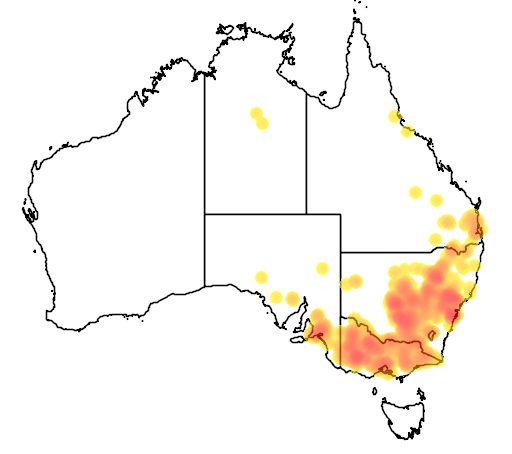Description
Common names
Wedge-leaf Hop-bush.
Scientific names
Dodonaea viscosa subsp. cuneata.
Family
Sapindaceae.
Genus
Dodonaea.
Name origin
Dodonaea, after Flemish botanist Rembert Dodoens (1517-1585). Viscosa, sticky. Cuneata, from Latin cuneus, referring to leaf shape.
Rainfall
250mm.
Growth rate
Fast.
Growth height
Up to 3m.
Presence in Australia
In many areas across the region.
This specie has been identified in the following Australian states: Qld, NSW, ACT, Vic, SA, NT.
Habitat
Mallee scrub in semi-arid areas and open forest. Mostly on sandy loams.
Habit
Compact spreading shrub to 3m high with wedge-shaped green leaves.
Site preference
Well-drained soil.
Characteristics
Occurs in clumps or as scattered plants in higher rainfall areas.
Flowering
Greenish, winter-spring.
Seed collection
Mid-Oct to early Feb. Monitor closely as seeds released immediately or 3-14 days after maturity. Papery capsules turn from red to tan-brown and brittle as seeds ripen. Seeds black and firm when ripe. Large quantities easily collected. Retains viability for several years.
Propagation
From seed (±212 seeds per gram), or cuttings. While untreated seeds germinate, hot water treatment hastens germination, which should take 2-4 weeks.
Regeneration
From seed, stem and coppice, particularly after fire. Establishes readily when direct seeded.
Shade and shelter
Useful low-level cover in windbreaks, due to multi-stemmed growth.
Land protection
Useful understorey in recharge planting. Useful in land rehabilitation such as stabilising sand.
Wildlife
Excellent habitat. Good pollen source for moths, butterflies and other insects including colourful beetles. Foliage good refuge for small birds. Fruits and seeds are forage for native birds. Kangaroos and wallabies browse foliage.
Koori
Dodonaea leaves used for pain relief. Leaves chewed for toothache (without swallowing the juice). Chewed leaves and juice used in treating stonefish and stingray wounds (usually bound to wound and left for several days).
Ornamental
Ornamental. Useful in hedges, screening, rock gardens and under trees. Three-angled fruits very colourful and attractive. Prune lightly to promote bushiness.
Other
Useful drought fodder in some arid areas, but protection from livestock necessary to preserve plants. Fruiting branches have cut flower potential.


